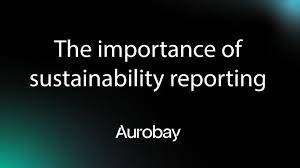Sustainability reporting is gaining unprecedented importance in the business world, signifying a shift towards responsible corporate practices. As companies strive to balance profitability with social and environmental concerns, sustainability reporting has emerged as a powerful tool for transparency and accountability.
Introduction
- Definition of Sustainability Reporting
Sustainability reporting involves the disclosure of an organization’s environmental, social, and governance (ESG) performance. It goes beyond financial metrics, providing a comprehensive view of a company’s impact on the planet and society.
- Growing Importance in Business
In recent years, the business landscape has witnessed a heightened awareness of sustainability. Consumers, investors, and even employees are increasingly prioritizing companies that demonstrate a commitment to ethical and sustainable practices. This has elevated sustainability reporting from a mere trend to a business imperative.
Benefits of Sustainability Reporting
- Environmental Impact
Sustainability reporting allows organizations to assess and communicate their environmental impact. This includes carbon emissions, resource consumption, and waste generation. By identifying areas for improvement, companies can implement eco-friendly practices and contribute to global environmental goals.
- Social Responsibility
Companies engaging in sustainability reporting address social issues, such as labor practices, human rights, and community engagement. This fosters a sense of social responsibility, positively impacting the communities in which they operate.
- Economic Advantages
Contrary to the misconception that sustainability is a financial burden, numerous studies have shown that sustainable practices can lead to cost savings and increased profitability. Sustainability reporting enables businesses to identify opportunities for efficiency and innovation, ultimately enhancing their economic performance.
Frameworks for Sustainability Reporting
- Global Reporting Initiative (GRI)
GRI provides a widely adopted framework for sustainability reporting. It offers guidelines for reporting on economic, environmental, and social aspects, providing a standardized approach that facilitates comparison across industries.
- Carbon Disclosure Project (CDP)
CDP focuses on environmental disclosure, particularly carbon emissions. Participating companies report their carbon footprint and climate-related risks, contributing to global efforts to combat climate change.
- Sustainability Accounting Standards Board (SASB)
SASB provides industry-specific standards for sustainability reporting. Tailored to the unique risks and opportunities of each sector, SASB standards enhance the relevance and reliability of reported information.
How Sustainability Reporting Influences Stakeholders
- Investors
Investors increasingly consider ESG factors in their decision-making processes. Sustainability reporting provides them with valuable information to assess a company’s long-term viability and ethical standing, influencing investment decisions.
- Consumers
Modern consumers are more conscious than ever, preferring to support businesses aligned with their values. Sustainability reporting builds trust by transparently communicating a company’s commitment to ethical practices, attracting environmentally and socially conscious consumers.
- Employees
Sustainability reporting can be a powerful tool for employee engagement. Millennial and Gen Z employees, in particular, seek employers who share their values. Companies that prioritize sustainability attract and retain top talent, fostering a positive corporate culture.
Challenges in Implementing Sustainability Reporting
- Data Collection
One of the primary challenges in sustainability reporting is the collection of accurate and comprehensive data. Companies often struggle with gathering data from diverse sources and ensuring its reliability.
- Standardization
The absence of standardized reporting formats poses a challenge for both companies and stakeholders. Standardization efforts, such as GRI and SASB, aim to address this issue, but achieving widespread consistency remains a work in progress.
- Greenwashing
To enhance their public image, some companies engage in “greenwashing” – exaggerating or misrepresenting their sustainability efforts. This poses a challenge to the credibility of sustainability reporting and emphasizes the need for transparency and accountability.
Successful Case Studies
- Companies Leading in Sustainability Reporting
Several industry leaders have successfully integrated sustainability reporting into their business strategies. Examples include Unilever, Microsoft, and Patagonia, demonstrating that sustainability can be a source of competitive advantage.
- Positive Impacts on Brand Image
Companies that prioritize sustainability often experience positive impacts on their brand image. Consumers appreciate and reward ethical practices, leading to increased brand loyalty and positive word-of-mouth marketing.
Steps to Improve Sustainability Reporting
- Integration into Business Strategy
For effective sustainability reporting, companies should integrate environmental and social considerations into their overall business strategy. This ensures that sustainability is not treated as a separate initiative but becomes a core aspect of decision-making.
- Technology Solutions
Leveraging technology, such as data analytics and reporting software, can streamline the collection and analysis of sustainability data. Automation reduces the burden on companies and enhances the accuracy of reported information.
- Stakeholder Engagement
Engaging with stakeholders, including employees, customers, and investors, is crucial for successful sustainability reporting. Regular communication fosters transparency, gathers valuable feedback, and strengthens the company’s commitment to responsible practices.
Future Trends in Sustainability Reporting
- Impact of Technology
Advancements in technology, including blockchain and artificial intelligence, are likely to revolutionize sustainability reporting. These innovations can enhance data accuracy, transparency, and the ability to track supply chain sustainability.
- Regulatory Changes
As awareness grows, governments may introduce stricter regulations regarding sustainability reporting. Companies should anticipate and adapt to evolving regulatory landscapes, ensuring compliance and maintaining a positive reputation.
- Global Collaboration
The future of sustainability reporting may involve increased global collaboration. Companies, industries, and nations may work together to establish universal standards, facilitating consistent and comparable reporting worldwide.
Addressing the Critics
- Common Misconceptions
Addressing common misconceptions about sustainability reporting is essential. Many skeptics believe it is a costly endeavor with little tangible benefit. Dispelling these myths is crucial for fostering widespread acceptance.
- Clarifying the Value Proposition
Companies should clearly communicate the value proposition of sustainability reporting. Beyond meeting regulatory requirements, it is an opportunity for innovation, risk mitigation, and long-term business resilience.
Conclusion
In conclusion, sustainability reporting is not just a corporate responsibility; it is a strategic advantage. Embracing sustainability practices and transparently reporting on them can positively impact the environment, society, and a company’s bottom line. As businesses navigate the complexities of sustainable practices, effective reporting becomes a key driver for success.
FAQs
Is sustainability reporting mandatory for all businesses?
No, it’s not mandatory for all businesses, but many are voluntarily adopting it due to its benefits in attracting stakeholders.
How often should a company update its sustainability report?
The frequency varies, but an annual update is common. Some companies choose to report more frequently for increased transparency.

